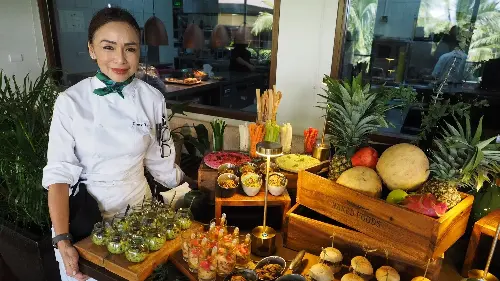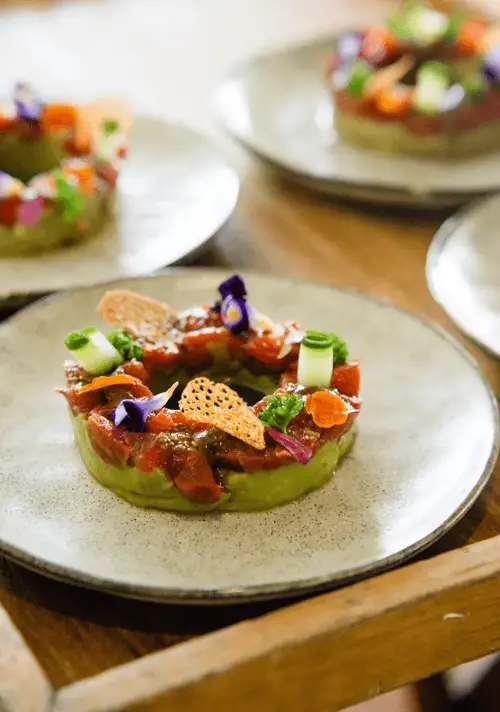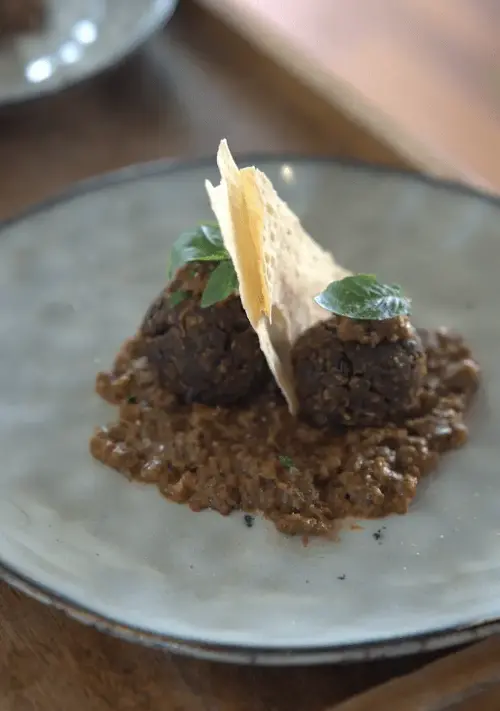
Some may raise eyebrows on plant-based diets, especially in a country like ours that loves meat and fish. “There’s the myth that it’s neither tasty nor affordable nor accessible. When people think of plant-based food, they think it’s just all salads,” says the raw and vegan plant-based chef, consultant and yoga teacher Cinty Yniguez.
According to the Harvard Health blog, “Plant-based or plant-forward eating patterns focus on foods primarily from plants. This includes not only fruits and vegetables, but also nuts, seeds, oils, whole grains, legumes, and beans. It doesn’t mean that you are vegetarian or vegan, and never eat meat or dairy. Rather, you are proportionately choosing more of your foods from plant sources.”
Yniguez’s Soul Menu at Anya Resort in Tagaytay explores the potential of flavors and tastes for plant-based dishes
The original Soul Menu at Anya launched in May of 2023 and a new one came out this month.
Yniguez’s new Soul Menu includes dishes like vegan tuna tartare, which is inspired by Yniguez’s travels to Brazil and Japan. The tuna tartare is served on top of an avocado wasabi mousse, with herb oil, and combines various textures and flavors that burst in the mouth.
“I love tuna. I wanted it perfect–tender, not crunchy, just right. The dish was prepared a couple of days in advance to allow the sauce to be infused as a marinade into the tartare. Putting all that together in your mouth is a mix of sweet, tangy and spicy,” says Yniguez.

Another dish to try is the savory lentil meatballs and porcini bolognese, which was notably served without pasta. The textures and flavors were, again, plentiful and delicious.

The Soul Menu also allows you to choose your own ingredients for the dishes; for example, if you don’t want a pâté made of nuts, you can select a pâté of sesame seeds instead.
Part of the plant-based journey is discovering a slew of new food options, especially the options that could replace the usual animal proteins, and seeing if these are food choices that they can also learn to love, and fit in their lives, including considerations of budget.
Growing interest
It may sound intimidating to pork adobo or sinigang na baboy lovers. Still, according to a 2024 survey conducted by Rakuten Insight, out of 6,152 female and 3,037 male respondents in the Philippines, 34% of both genders have tried plant-based alternatives to animal food products. The same 34% of respondents consumed plant-based products several times weekly.
The gist: There’s certainly interest in this kind of diet. Especially in a country where traditional foods can be fatty and salty, those percentages may signal a considerable want to switch to something that is a little healthier.
Again, switching doesn’t mean completely going vegetarian or vegan. One could, for example, switch out one meal out of the three in a day from a rich, animal-based meal to a plant-based one. Or one could also simply lessen animal portions, and add in some more greens or simple, accessible and affordable vegetables like tomatoes and carrots in one meal.
Start small, says Yniguez.
“As a nutrition coach, I would advise people, ladies and gents in their twenties and thirties, to start small so that they can build habits and incorporate more plant-based food into their diet. Sometimes, it is about cultivating the art of small, mindful steps, when incorporating plants into your diet. Maybe it’s also about accessibility, knowing what is and is not accessible. Sometimes, it’s a matter of, first of all, equipping themselves with the knowledge that plant-based options are available.”
“A lot of times, people don’t know if they want to shift [to a plant-based diet], and they have a hard time shifting because they don’t know where to buy stuff,” she continues. “They don’t know how start a habit, or maybe they don’t understand so much. What’s not good, for example? Sodium, for example. It’s the little things [they have to learn],” says Yniguez.
Start by practicing at home. Look at your pantry, review what you have on hand, and slowly replace your stocks with a capsule pantry that has plant-based variants. Yniguez says that once you have options for a plant-based diet at home, you’ll eventually be able to change and improve your lifestyle. You could begin with one plant-based meal a week, then increase it over time to two meals a week, then once a day and so forth.
“People will realize and notice the difference that it has or the impact that it has on their body and on their mental health as well.”
From there, an individual may decide on the right mix for them, depending on their taste, and the positive impact they feel on their body.
Is a plant-based diet the end-all, be-all for immortality? Current academic literature have found benefits in fruits, non-starchy vegetables, nuts, and whole grains. On the mainstream end, several Netflix shows like The Game Changers and You Are What You Eat: A Twin Experiment have found good things too, with the latter actually being fully based on a Stanford study wherein one twin ate strictly plant-based, while the other ate plant-based, and regular foods derived from animals.
Yet, Christopher Gardner, a Stanford University professor and senior author of the study, as quoted by Time, said, “What’s more important than going strictly vegan is including more plant-based foods into your diet.” The Time article also noted how it’s difficult to find sources of important nutrients like Vitamin B12 and D in strictly plant-based diets, and other ways such as the Mediterranean diet, which includes fish, has also led to long lives.
Honing in on a diet that works for you is a game of personal choice, informed by scientific knowledge, and weighed against your own tastes and other practical concerns—and it’s a game that’s best taken slowly, according to Yniguez.
As Yniguez describes it, for most, the move to a healthier diet is not something that you can just immediately switch on. There’s a deliberate, engaged process to it. So if you can’t do it like the chef immediately, don’t despair; Yniguez has been practicing a healthy eating lifestyle for 23 years now.
The chef says, it’s a step-by-step process that you can do mindfully and slowly. “I made it my mission in life to incorporate a healthy lifestyle when my mom passed away–including sleep and stress management. Then, I took yoga, which was grounding and centering. Slowly, I shifted. I eliminated red meat, then chicken. And then I said, ‘I’m going to eliminate seafood as well.’ My body just adapted, and it got used to it.”
Yniguez, who founded Naked Foods, which offers curated and handcrafted plant-based products, has a Culinary Wellness Academy where she teaches plant-based cooking to individuals, along with a Culinary Wellness Academy Chef program in tandem with Anya. Both focus on culinary health education fundamentals. “There’s that myth we want to debunk, you know?” – Rappler.com
